Veranstaltungen und Aktivitäten
DIJ co-hosts symposium on animal welfare at Nichibunken
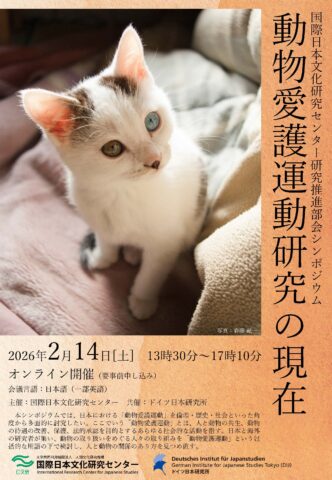
Together with the International Research Center for Japanese Studies in Kyoto (Nichibunken), the DIJ will co-host the international symposium The Current State of Animal Welfare Movement Research (main language: Japanese) on February 14-15. It aims to explore the animal welfare movement in Japan from multiple perspectives, including ethics, history, and society. The term “animal welfare movement” here refers to all social activities aimed at human-animal coexistence, improving animal treatment, protection, and legal recognition. Four researchers from Japan and abroad, including DIJ sociologist Barbara Holthus („The Sociology of Humans and Pets: Happiness, Loneliness, Multispecies Families“, in Japanese), will give presentations to examine human efforts concerning animal treatment under the umbrella term “animal welfare movement,” re-examining the nature of human-animal relationships. Participation in the symposium is only possible online.
DIJ Roundtable on recruitment and training strategies

Japan is a highly attractive, but difficult market for multinational companies. Their presence is by far the lowest among the OECD when measured by the stock of foreign direct investment relative to GDP. One of the biggest hurdles is the recruitment of qualified personnel. What strategies do foreign companies in Japan pursue to address the human resource challenge? To what extent do their strategies incorporate practices applied in their home market? This DIJ Roundtable presents findings from interviews with 25 experts from the field of human resource management in ten German companies in Japan. The presentation by Matthias Pilz will be followed by a panel discussion with Shigeki Egami and Carolina Kawakubo, moderated by Franz Waldenberger, a Q&A session, and a networking reception. Details and registration here
Book chapter by Dolf Neuhaus explores industrial education in colonial Korea

Vocational and industrial training loomed large in Japanese colonial education in Korea. Between 1910 and 1945, Japanese authorities implemented an education system that concentrated on industrial education for Koreans, who were generally portrayed as possessing a low level of civilization. Geared toward assimilating Koreans as Japanese subjects, this system was characterized by segregation and discrimination with severely restricted access to higher education for Koreans. Comparing the perspectives of missionaries, Korean students, and Japanese colonial authorities, Dolf-Alexander Neuhaus‚ book chapter “Training the Heart, the Head, and the Hand”: Colonial Education, Missionaries, and Industrial Schools in Korea, 1906–1930 examines the YMCA’s pioneering role in industrial education as a site where Protestant work ethics, Korean aspirations for modernization, and colonial policy converged — and sometimes directly conflicted. The chapter is published in The Gospel of Work and Money. Industrial Education and Its Global Legacies, edited by O. Charbonneau and K. V. Walther (University of Pennsylvania Press 2026).
Neues Buchkapitel von David M. Malitz zu Buddhismus und japanisch-siamesische Beziehungen
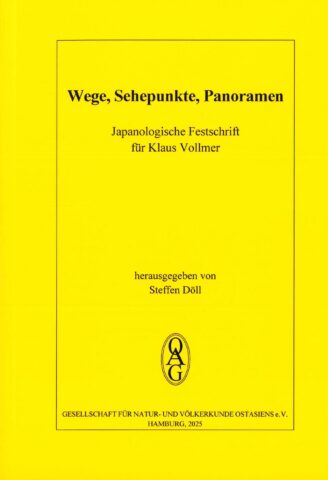
DIJ-Forscher David M. Malitz hat das Kapitel „‚Länder der gleichen Religion‘? Der Buddhismus und die japanisch-siamesischen Beziehungen im Zeitalter der absoluten Monarchie Siams“ beigetragen zum Sammelband Wege, Sehepunkte, Panoramen. Japanologische Festschrift für Klaus Vollmer (Hg. Steffen Döll, Hamburg: Gesellschaft für Natur- und Völkerkunde Ostasiens). Das Kapitel untersucht die Rolle des Buddhismus in der frühen Phase der modernen japanisch-thailändischen Beziehungen und stützt sich dabei auf Primärquellen aus Japan und Thailand. Der Schwerpunkt liegt auf dem Zeitraum von der Aufnahme formeller diplomatischer Beziehungen im Jahr 1887 bis zur Verfassungsrevolution von 1932. Obwohl der Buddhismus häufig als gemeinsamer kultureller und religiöser Bezugspunkt herangezogen wurde, zeigt das Kapitel, dass auch doktrinäre Unterschiede und divergierende klösterliche Praktiken zwischen den japanischen Mahāyāna-Schulen und dem siamesischen Theravāda-Buddhismus eine entscheidende Rolle spielten, um Fragen der nationalen Identität, der Hierarchie in den Außenbeziehungen, der Modernität und der politischen Legitimität innerhalb der buddhistischen Welt zu verhandeln. Die Festschrift ehrt den seit Sommer emeritierten Japanologen Klaus Vollmer (LMU München).
Hybrid Study Group on Haga Yaichi and the Imagination of National Identity
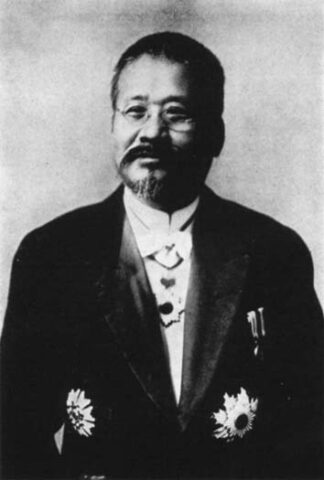
In 1907, amidst the national triumph following the Russo-Japanese War and the domestic unrest symbolised by the Hibiya riots, Haga Yaichi published Kokuminsei jūron [Ten Essays on National Character]. As an heir to the kokugaku tradition, a “father” of Japan’s literary canon, and a transmitter of German philology, Haga identified ten characteristics of the Japanese people in this widely circulated volume. While scholars in the 1970s embraced it as a precursor to nihonjinron, recent scholarship has reinterpreted it primarily as a tool of governmental suppression. This presentation challenges both interpretations through a close reading and contextual analysis. It aims to expand our understanding beyond familiar themes of imperial loyalism or agrarian nostalgia, reframing kokuminsei as a dynamic site of identity production. Details and registration here
DIJ researchers at ‚Southeast Asia and Indo-Pacific Imaginaries‘ conference
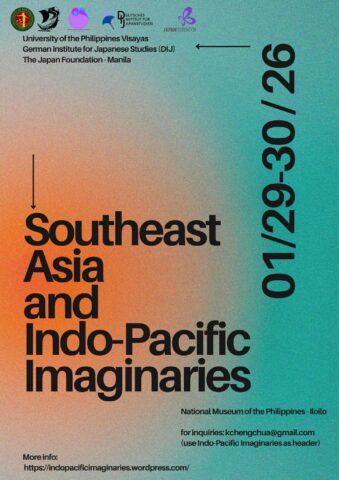 The present geopolitical landscapes are shifting, with global powers realigning their strategies. The Free and Open Indo-Pacific (FOIP), a concept proposed by then Prime Minister Shinzo Abe, aims at promoting peace and prosperity in the region, particularly in the fields of fundamental values, economic prosperity, and peace and stability. Southeast Asia has been one center of this strategy with a particular focus on maritime security and safety. The conference Southeast Asia and Indo-Pacific Imaginaries takes an interdisciplinary approach to study FOIP strategies. It features two DIJ panels, including research papers by David M. Malitz (“Japanese-Indian Relations and the Imaginations of an Indo-Pacific Region”) and Dolf-Alexander Neuhaus (“Developmental Imaginaries: Japan’s Educational Aid Programs and the Shaping of the Indo-Pacific Order”). The conference is co-hosted by University of the Philippines – Visayas, the Japan Foundation Manila, and the DIJ and takes place 29–30 January 2026 at the National Museum of the Philippines, Iloilo.
The present geopolitical landscapes are shifting, with global powers realigning their strategies. The Free and Open Indo-Pacific (FOIP), a concept proposed by then Prime Minister Shinzo Abe, aims at promoting peace and prosperity in the region, particularly in the fields of fundamental values, economic prosperity, and peace and stability. Southeast Asia has been one center of this strategy with a particular focus on maritime security and safety. The conference Southeast Asia and Indo-Pacific Imaginaries takes an interdisciplinary approach to study FOIP strategies. It features two DIJ panels, including research papers by David M. Malitz (“Japanese-Indian Relations and the Imaginations of an Indo-Pacific Region”) and Dolf-Alexander Neuhaus (“Developmental Imaginaries: Japan’s Educational Aid Programs and the Shaping of the Indo-Pacific Order”). The conference is co-hosted by University of the Philippines – Visayas, the Japan Foundation Manila, and the DIJ and takes place 29–30 January 2026 at the National Museum of the Philippines, Iloilo.
David Malitz joins roundtable discussion with Thai Foreign Minister
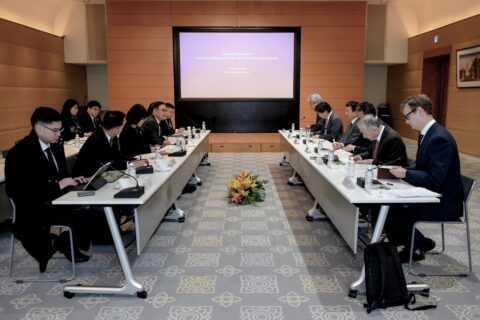 On December 19th, DIJ Principal Researcher David M. Malitz was invited to join a roundtable discussion with Thai Foreign Minister Sihasak Phuangketkeow and Japanese academics at the Royal Thai Embassy in Tokyo. As the head of the research cluster Japan in Transregional Perspective, David conducts research on Japan-Southeast Asia relations. The discussion covered regional developments, Japan-Thailand relations, and potential future cooperation between the two countries. Thailand is a key economic partner of Japan, hosting approximately 6,000 Japanese companies and over 70,000 Japanese nationals. In November 2022, bilateral relations were elevated to the status of a Comprehensive Strategic Partnership. The year 2027 will mark the 140th anniversary of the establishment of diplomatic relations between Japan and Thailand.
On December 19th, DIJ Principal Researcher David M. Malitz was invited to join a roundtable discussion with Thai Foreign Minister Sihasak Phuangketkeow and Japanese academics at the Royal Thai Embassy in Tokyo. As the head of the research cluster Japan in Transregional Perspective, David conducts research on Japan-Southeast Asia relations. The discussion covered regional developments, Japan-Thailand relations, and potential future cooperation between the two countries. Thailand is a key economic partner of Japan, hosting approximately 6,000 Japanese companies and over 70,000 Japanese nationals. In November 2022, bilateral relations were elevated to the status of a Comprehensive Strategic Partnership. The year 2027 will mark the 140th anniversary of the establishment of diplomatic relations between Japan and Thailand.
DIJ Newsletter Winter 2025/26
 Innovation, games, machizukuri, climate, and ‘the mouse’: the winter issue of our DIJ Newsletter features updates on our research, publications, and events as well as news from the Institute, our team, and our outreach activities. We hope you will enjoy exploring this new edition of the DIJ Newsletter. If you haven’t done so yet, you can subscribe to receive our Newsletters directly to your inbox. The full issues and subscription form are available here.
Innovation, games, machizukuri, climate, and ‘the mouse’: the winter issue of our DIJ Newsletter features updates on our research, publications, and events as well as news from the Institute, our team, and our outreach activities. We hope you will enjoy exploring this new edition of the DIJ Newsletter. If you haven’t done so yet, you can subscribe to receive our Newsletters directly to your inbox. The full issues and subscription form are available here.





 Open Access
Open Access 
